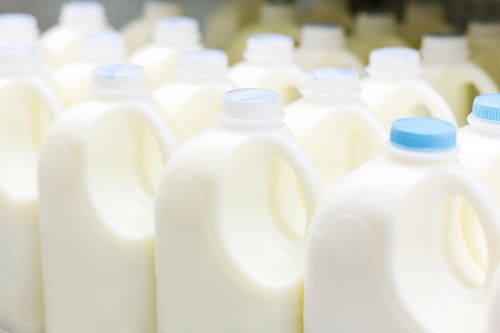Don’t Call Plant-Based Milks “Milk,” Congressional Leaders Tell FDA
In a letter to FDA last week, 32 members of Congress asked the agency to find some other name for non-dairy milks.
Photo © iStockphoto.com/Danilin

Step off, soy, almond, and hemp milk: In a letter to FDA last week, 32 members of Congress asked the agency to find some other name for non-dairy milks, claiming that the term milk misleads consumers into thinking that plant-based milks offer equivalent nutrition to dairy milk-a claim the Congressmen say is not true.
“We strongly believe that the use of the term milk by manufacturers of plant-based products is misleading to consumers, harmful to the dairy industry, and a violation of milk’s standard of identity. We request that the Food and Drug Administration (FDA) exercise its legal authority to investigate and take appropriate action against the manufacturers of these misbranded products,” stated the 23 members of Congress led by Reps. Peter Welch (D-VT) and Mike Simpson (R-ID). As NPR pointed out, many of those Congressmen are from heavily-milk-producing states.
As dairy milk sales continue losing market share to plant-based milks, there is real concern, the Congressmen wrote, “that the dairy industry will continue to face depressed prices in the immediate future” and “unless more is done, many more farmers will be forced to sell their herds.”
Earlier this year, market researcher Mintel confirmed dairy milk’s falling sales. It reported that U.S. dairy milk sales had decreased 7% in 2015 to $17.8 billion and were expected to drop by another 11% through 2020. Meanwhile, Mintel said, U.S. sales of non-dairy milks continue to grow strongly, gaining 9% in 2015 to $1.9 billion. In their letter, the Congressmen stated that “a recent Neilson survey revealed that in the past five years, sales of certain plant-based [alternatives] grew 250% to more than $894.6 million. By contrast, sales of milk fell 7% in 2015.”
“Dairy farmers are facing a serious financial crisis,” they wrote. “These hard-working Americans have experienced deep cuts in income as milk prices have plunged 40% since 2014.”
Non-dairy milks are “imitation products” that do not offer the same nutritional properties as dairy milk and thus should not be allowed to use the word milk, they stated. “While consumers are entitled to choose imitation products, it is misleading and illegal for manufacturers of these items to profit from the ‘milk’ name. These products should be allowed on the market only when accurately labeled. We urge FDA to enforce this matter by requiring plant-based products to adopt a more appropriate name that does not include the word milk.”
The letter goes on to cite the legal definition of milk as “the lacteal secretion, practically free from colostrum, obtained by the complete milking of one or more healthy cows” (21 CFR 131.110). Milk, produced by the mammary gland, also has a unique nutritional value, providing an excellent source of protein and a wide array of vitamins and minerals, including calcium, vitamins A and D, and potassium. Plant-based products clearly fail to meet this standard of identity. They are unable to match the nutritional makeup of the product they mimic, yet they continue to be marketed as milk.”
Dairy milk advocates praised the action by lawmakers. In a press release, Jim Mulhern, president and CEO of the National Milk Producers Federation (NMPF), said, “You haven’t ‘got milk’ if it comes from a seed, nut, or bean. In the many years since we first raised concerns about the misbranding of these products, we’ve seen an explosion of imitators attaching the word milk to everything from hemp to peas to algae. We don’t need new regulations on this issue, we just need FDA to enforce those that have been on the books for years.” In the same press release, Michael Dykes, president and CEO of the International Dairy Foods Association, said that most non-dairy beverages are “nutritionally inferior” to dairy milks.
This is not the first time the dairy-milk industry has attempted to block the non-dairy industry’s use of the term milk. As NPR reports, back in 2000, the NMPF asked FDA not to allow soymilk makers to use the term.
Also read:
Non-Dairy Milk Surges, Dairy Milk Slumps
Plant-Based Food and Drinks Are Scaling the Food Chain
Jennifer Grebow
Editor-in-Chief
Nutritional Outlook magazine
jennifer.grebow@ubm.com
Prinova acquires Aplinova to further increase its footprint in Latin America
April 7th 2025Prinova has recently announced the acquisition of Brazilian ingredients distributor Aplinova, which is a provider of specialty ingredients for a range of market segments that include food, beverage, supplements, and personal care.
HHS announces restructuring plans to consolidate divisions and downsize workforce
Published: March 27th 2025 | Updated: March 27th 2025According to the announcement, the restructuring will save taxpayers $1.8 billion per year by reducing the workforce by 10,000 full-time employees and consolidating the department’s 28 divisions into 15 new divisions.











